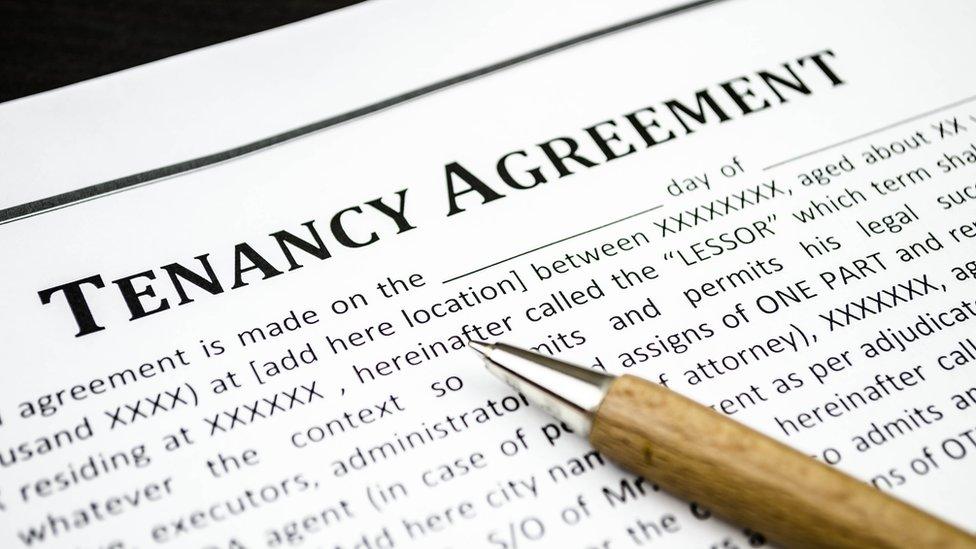'It's very precarious' - Life as a renter
- Published

A third of millennials could face living in private rented accommodation for the rest of their lives according to a report by the Resolution Foundation.
For many, a lifetime of renting means living with the threat of arbitrary evictions, unaffordable rent rises and the whims of landlords.
"The law is so stacked against the tenant," says Dan Wilson Craw, from campaign group Generation Rent.
Christina, 30, from London, says she felt forced to accept living in a badly-maintained flat for fear of being asked to leave if she pushed her landlord to fix things.
"The flat had a serious mouse problem and the bathroom ceiling was virtually black with mould," she says.
She also had concerns about her security, explaining: "He had the keys to my house with all my stuff in it. I started keeping important documents and valuables at work because I didn't trust him."
'Revenge evictions'
Dan Wilson Craw says the main problem is "Section 21" - a piece of law that allows landlords to evict tenants without a reason.
"It means that you have no idea whether you will be living in your home next year," he adds.
In 2015, a law was introduced to make so-called revenge evictions - carried out after a tenant complains about something - illegal, but it only applies to rental agreements signed since then.

Sam Gomyer feels life as a renter is "very precarious"
After three years of living in London, part-time student Sam Gomyer is renting his fourth property - two were sold and a rent increase forced him out of the third.
"I felt like I was cursed," he told the BBC, with one landlord even pulling out of a deal a week before he was due to move in.
"The laws on that should be different," he says.
"I was suddenly in this situation where I thought I had a home but it wasn't legally bound so they can just turn me down last minute - it was very precarious."
One man, who lives in Aylesbury, Buckinghamshire but wished to remain anonymous, told the BBC rent rises every year mean his family struggles to make ends meet.
"Everywhere else we look they are expecting at least a thousand [in rent] so if we lose our current place we're really in trouble," he says.
"We can't help but feel restricted in a place that is meant to be our own home.
"It could be reclaimed at any moment at the whim of the landlord or agents."

Matt Winter, a postman from Stevenage, was forced to leave his home of four years when the landlord wanted to sell the property.
With three young children - including one child with autism - finding suitable accommodation proved very difficult.
The family has now settled into a new home but Matt says he still worries about the future.
"The last year has only opened our eyes to what can happen so easily," he adds.
A 30-year-old woman, who also didn't want to be named, says her landlady frequently lets herself into her London flat without giving notice.
She worries that complaining about this will mean her tenancy is not extended and does not believed the law protects renters such as herself.
"There are laws in some cases but unless you can afford hefty court fees they don't really serve much purpose," she says.
"When it boils down to it landlords can pretty much do what they want. We could be out of a home in less than five months, and there's not a thing we can do about it."


Generation Rent, which campaigns for secure and affordable privately rented homes, is calling for the introduction of indefinite tenancies.
"As long as the renter is paying the rent the tenancy would continue - the assumption is that it is a home," explains Dan Wilson Craw.
He says the majority of landlords behave responsibly, but warns: "The law is so stacked against the tenant you can't make the assumption that your landlord is one of the good ones."
Chris Norris, director of policy and practice at the National Landlords Association, says: "In the last few years we've had new laws to prevent so called revenge evictions, greater taxation of landlords, and tougher regulation of letting agents.
"However, the fact remains that the overwhelming majority of tenancies are ended by tenants, not landlords - and the majority of landlords don't simply hike rents or end tenancies without a good reason."
- Published9 July 2020

- Published17 April 2018

- Published9 February 2017
